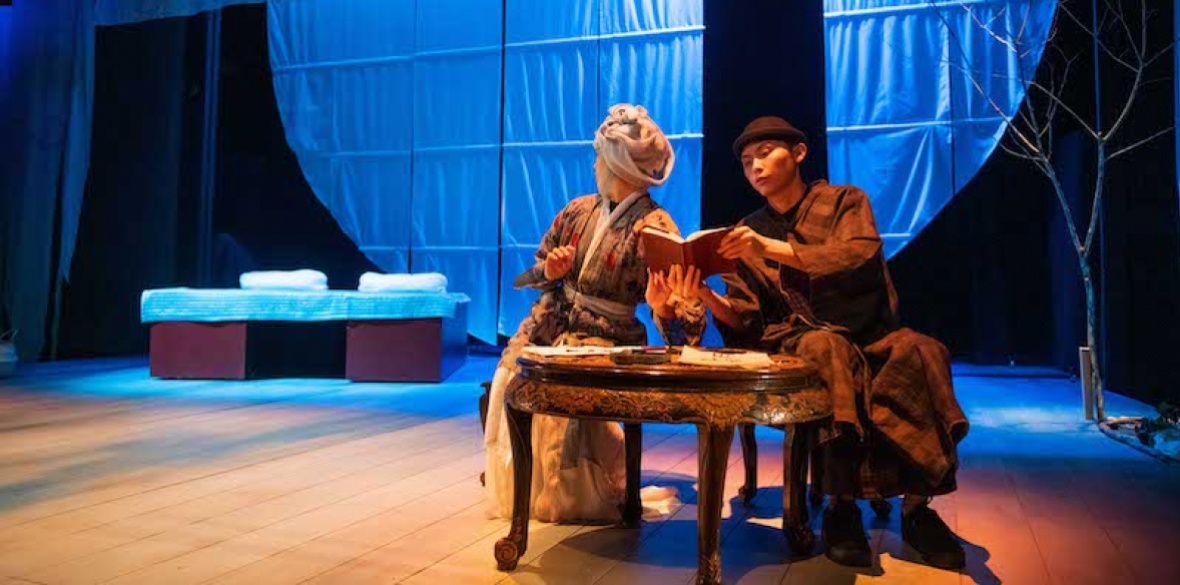This is the last article you can read this month
You can read more article this month
You can read more articles this month
Sorry your limit is up for this month
Reset on:
Please help support the Morning Star by subscribing here
Strange Tales
★★★
I Can Go Anywhere
★★★★
Traverse Theatre Edinburgh
WHILE other theatres offer panto, the Traverse is serving up two helpings of bold new writing that chime as much with the political season as with Christmas.
What can you do when a man has no heart? is a topical question to ask about any number of Tories and it comes to mind watching GridIron Theatre’s adaptation of Pu Songling’s 17th-century Strange Tales, which gives a Chinese twist to this Dickensian dilemma.
What is done to resolve it here is to seek out the poorest and most despised beggar on the streets, prostrate yourself, endure their insults and eat their phlegm.
Then, kneeling beside the heartless man, vomit the nauseating poverty-phlegm into the cavity where the man’s heart should be and —hey presto! — he comes back to life as a decent, caring socialist. Eat phlegm, Boris Johnson.
There’s an angry radicalism to these tales — you can see why they appealed to Kafka and Borges — and a bracing directness that is peculiarly Chinese. A contemporary of Shakespeare, but more akin to Brecht, Pu Songling intended his stories as a social critique of a sclerotic society.
Gridiron deploy trapdoors and digital projection, puppets and illusionism and a multiethnic cast of three to step lightly through the archetypes. They advise us to beware of the mysterious power of these folk tales but the emphasis on superstition neutralises the revolutionary message. It would be better to treat the audience as sentient political adults.
In Douglas Maxwell’s I Can Go Anywhere, a traumatised rape victim seeks asylum in Britain and to prove his “Britishness” translates himself into a mod, a strategy which echoes and parodies the way immigrants used to aspire to be “gentlemen.”
It’s camouflage and so effective it’s as though he had ordered a mod from Amazon. But it’s a fake and, in a mad twist, he seeks authentication from a depressive Scottish cultural historian. The problem is that he was sodomised by men and the academic is gay.
Each character performs but neither listens. If the asylum-seeker is like a clown, to the self-loathing academic he is like a muse and the clown act is mirrored by flights of self-indulgent intellectual showboating.
It’s unsettling theatre — not a threat game like Pinter or an absurd game like Ionesco but a seduction, an erotic game between an older and a younger man.
The underlying theme is how an immigrant’s desperate bid for survival is able to manipulate a bourgeois homosexual but the dramatic potential of this dangerous love dance degenerates into homophobic stereotypes. It seems that for Marshall, homosexuality is a convenient shorthand for trauma rather than something he is willing to dramatise.
A shame, yet I relished the performances, particularly Nebli Basani’s manic mod, with his virtuoso repertoire of ADHD twitches, waspish laughs, pleading stares and tactical charm.
But I missed the genuine homoerotic charge that is surely the true spark between the men in this disturbing, powerful two-hander.
Both productions run until December 21, box office: traverse.co.uk











